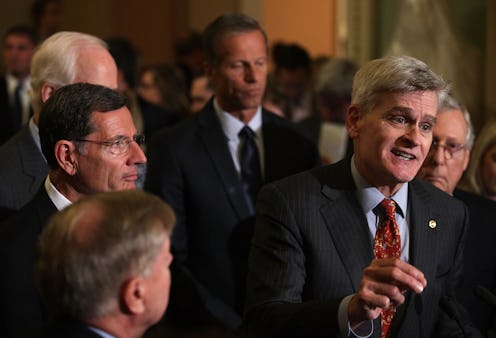News
Even GOP Politicians Literally Do Not Understand Their Own Health Care Bill

After failing to do so in August, Republicans are trying one last time to repeal Obamacare. The budget rules that allow them to pass the bill through the Senate with only 50 votes (instead of 60) expires on September 30, so the Republicans are moving fast, trying to see if they put together 50 yes votes by the end of next week, and they're not waiting around for to even get its effects on the health care market assessed by the nonpartisan Congressional Budget Office before the vote. In the haste, the specifics of the bill have gotten a little lost, to the point where Republican senators couldn't explaining details of the health care bill.
Vox reporter Jeff Stein spoke to nine different Republican senators and asked them what they liked about this health care bill and why it would be good for the American people. Even the best explanations — that it would give states more freedom to set their own health care policies (though there is doubt that the Senate rules allow this bill to do that) — led to Republicans without explanations for why it would simultaneously cut health care funding for states (though Senators from Alabama accurately pointed out that Alabama is one of just 16 states that would actually get more money under the bill).
But for the most part, the clearest explanation Republicans offered had nothing to do with the bill itself or even health care policy — this is their last chance to repeal Obamacare, so whatever bill they have is good enough.
Senator John Kennedy (R-LA) perhaps explained it most simply: "First chance I get to vote to repeal it, I'll do it."
The craziest explanation for why the Republicans have to pass this bill that every major health care group opposes comes from Senator Pat Roberts (R-KS), who referred to the movie Thelma & Louise and said Senators had to jump out of the moving car that is Obamacare into whatever option they could find.
Elsewhere in Stein's interview, Roberts gave what might be the most accurate explanation for why Republicans are so intent on passing this bill despite not being able to explain how it would help Americans' health care: "If we do nothing, I think it has a tremendous impact on the 2018 elections. And whether or not Republicans still maintain control and we have the gavel."
Senator Chuck Grassley (R-IA) made a similar point: "The political answer is that Republicans have promised for seven years that we were going to correct all the things that were wrong with Obamacare, and we failed the first eight months. This is the last attempt to do what we promised in the election."
But this is a perhaps a strange argument considering how the public has reacted so far to attempts by Republicans to repeal Obamacare. Some top Republican donors have expressed hesitation in investing money in Republican campaigns if Republicans couldn't repeal Obamacare, so that may affect motivation.
Axios spoke with a GOP legislative aide on the condition of anonymity, who expressed frustration that his or her bosses seem to be ignoring the consequences of the health care bill. "I am just in shock how no one actually cares about the policy any more."
The aide continues: "If there was an oral exam on the contents of the proposal, graded on a generous curve, only two Republicans could pass it. And one of them isn't [the bill's sponsor] Lindsey Graham."
With the rushed schedule, it doesn't seem clear that Republicans even care about some of the concerns they had before. In the last iteration of the bill, several Republican senators sought to lessen cuts to Medicaid and ensure that cutting health care didn't cause problems in dealing with the opioid crisis. This bill cuts Medicaid heavily, and doesn't provide help in fighting opioids, but those concerns haven't seemed to matter this time around. And that doesn't even get into the changes in the bill that allow states to waive regulations protecting pre-existing conditions, which Trump promised to protect.
The rush to pass a bill, without having time to figure out its effects, is strange from a party that has been promising to "repeal and replace" the Affordable Care Act for more than seven years. After all that time, when things are down to the wire, it seems that the actual meaning of "replace" has stopped being important.